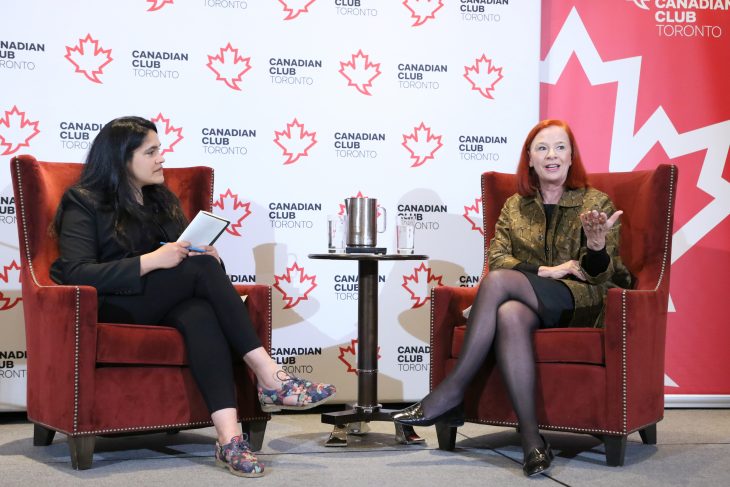
TORONTO – CBC/Radio-Canada is on a mission to make things safer for journalists at a time when attacks on them are becoming increasingly troublesome.
“We no longer have the luxury of believing that attacks on journalists don’t happen in a country like ours,” CBC/Radio-Canada president and CEO Catherine Tait (above, right) said yesterday afternoon during a speech at the Canadian Club Toronto for World Press Freedom Day.
“I’m concerned by three trends in particular: how social media is being used to abuse and intimidate journalists; how state actors and extremists are weaponizing these platforms to silence journalists; and how some are deliberately subverting facts and truth for personal, and even political, gain,” Tait said.
Later, in conversation with Saroja Coelho (left), host of Mornings on CBC Music, Tait emphasized the urgency of the issue in Canada.
“Something has changed. People are attacking the CBC logo vehicles. We’ve never seen that in the history of this organization… and at Global and at CTV, so we have to really address what’s going on at home and talk about it.”
During her speech Tait announced CBC/Radio-Canada is addressing the issue in part through the release of “a guide of best practices to help newsrooms support their teams.”
The guide was “an industry-wide effort, and we’ve worked with the Toronto Star, CTV News, Global News, La Presse, APTN and the Canadian Association of Journalists, among many others,” she explained.
For Tait, the need to do something about attacks on journalists stemmed from the publication of a UNESCO report in 2020. The report explains how women and racialized journalists are disproportionately affected by online violence and leaving the profession because of it. (The report’s findings are based on a global survey conducted by UNESCO and the International Center for Journalists late in 2020.)
“When I put that together, I thought, oh my goodness … we can’t afford to lose any journalist, but to be losing those voices, women and racialized journalists, would be extremely deleterious to the health of our journalism in this country,” Tait said during an interview with Cartt.ca.
CBC/Radio-Canada has since been taking steps in addition to the guide for newsrooms, to understand and address the problem.
To help foster a better understanding of the problem and discuss solutions, the public broadcaster hosted the virtual forum #NotOK – Stand Up for Journalism and Democracy last November for journalists and media professionals around the country.
Another step CBC/Radio-Canada has taken is entering into talks with major platforms including Twitter and Facebook, asking them to enforce the policies they already have in place regarding toxic, aggressive and hostile information, Tait explained.
“But the problem is they don’t take action quickly enough removing it,” she said. “And oftentimes their assessment of what they consider to be offensive does not correspond to ours, so we are really trying to get a common conversation going there and then at the same time, working with legislation, working with the government to try to see if we can’t have online harm be considered a crime.”
The conversations CBC/Radio-Canada has been undertaking with the platforms are ongoing.
“These are large organizations that… are entirely driven by their commercial revenue model,” Tait said.
She did acknowledge Twitter took former U.S. president Donald Trump off the platform for inciting violence, but argued that was an extreme case.
“The kind of verbal violence that we see against women journalists, or racialized journalists, is equally worrisome and that content can stay up for a very long time and the harm has been done already,” Tait said.
The public broadcaster is also meeting with the RCMP as well as public security officials to talk about putting a better, more immediate response protocol in place for dealing with situations that come up because as it is, journalists who are the subject of attack have to handle the situation themselves.
“There isn’t one phone number to call – the bat phone solution,” said Tait. “And that’s really what we’re trying to get – some kind of system where there is greater support and presumably once we have a collective understanding of the problem, you’ll start to see a shift in behaviour, hopefully.”
CBC/Radio-Canada is further looking at the government’s potential online harms bill as an avenue to bring about change specifically for journalists.
“Our hope is that we can persuade the legislator that there should be a specific identification of journalists just as they might be on for politicians that online harm, again, disproportionately targets those groups of people,” Tait said.
In-house, CBC/Radio-Canada is looking at providing specific training for journalist to help them deal with hostility.
The focus to this point has been on hostile environments in war zones, which is a very specific type of training, Tait explained, adding “you can’t quite describe the protests in Ottawa as a war zone, but if people start getting attacked or spat upon, you do have to start a better level of training for journalists to keep them safe.”
Addressing this issue is essential for Tait because of the role CBC/Radio-Canada plays in the country.
“Richard Stursberg said… this is really the most important work that CBC/Radio-Canada faces at this time – the pressure, the mounting pressure of people who see us as the enemy, as opposed to us as the solution,” she said.
“And I keep on saying, we are the solution to build social cohesion – that is why we exist, to connect this vast country.”
Photo supplied by CBC.



